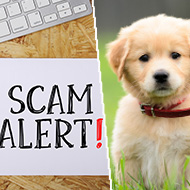
More than £282,000 lost during March and April, according to Action Fraud.
Potential pet owners are being urged to protect themselves from online criminals during lockdown after more than 600 people fell victim to an online scam involving the purchase of pets.
According to Action Fraud, 669 people lost a combined total of £282,686 during March and April after putting down deposits for cats and dogs they had seen online but never received.
The adverts were posted on pet and general online selling websites, as well as social media, and victims were asked to put down a deposit to secure their purchase. They were told that they could not visit the animal or pick it up in person due to the current social distancing requirements.
After the initial payment, the fraudsters proceeded to request more money from the victims to cover insurance, vaccinations and even the delivery of the pet. Cases have been reported across the UK, with Action Fraud reporting a spike of 524 cases in April, triple that of the number reported in March.
Pauline Smith, head of Action Fraud, said: “The fact criminals will even exploit an international crisis, such as the one we find ourselves in now, to take innocent people’s money is especially cruel. But, unfortunately, as we spend more time online, and are forced to adapt to a new way of life, opportunities will arise for criminals to commit fraud.
“During these unprecedented times, it may seem quite plausible that you should have to pay a deposit for a pet and that you wouldn’t be able to see the animal in real life first. However, we would encourage you to think carefully before you transfer any money – do you know and trust this person?”
The RSPCA said that it has investigated many criminal gangs who are willing to exploit animals during the COVID-19 pandemic.
An RSPCA spokesperson said: "We'd urge anyone thinking of getting a new pet to think long and hard about whether they can properly care for that animal, not just now but into the future when restrictions are lifted and their lifestyles become more busy.
“If people do decide now is the right time to get a pet, then we'd always urge them to consider adopting instead of buying an animal. We still have thousands of animals in our care at the moment and have restarted rehoming some animals in England with strict measures to keep our staff and the public safe.”



 The Veterinary Medicines Directorate (VMD) is inviting applications from veterinary students to attend a one-week extramural studies (EMS) placement in July 2026.
The Veterinary Medicines Directorate (VMD) is inviting applications from veterinary students to attend a one-week extramural studies (EMS) placement in July 2026.